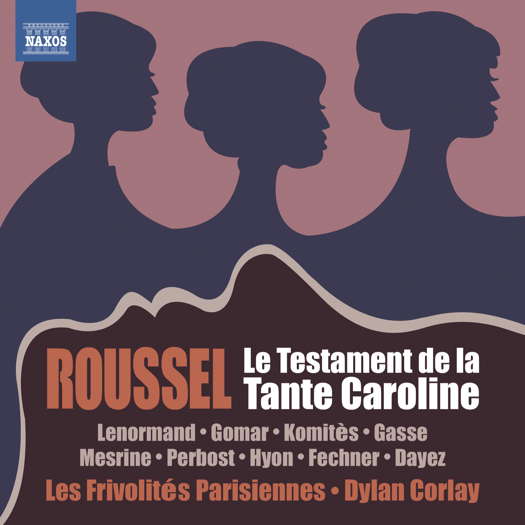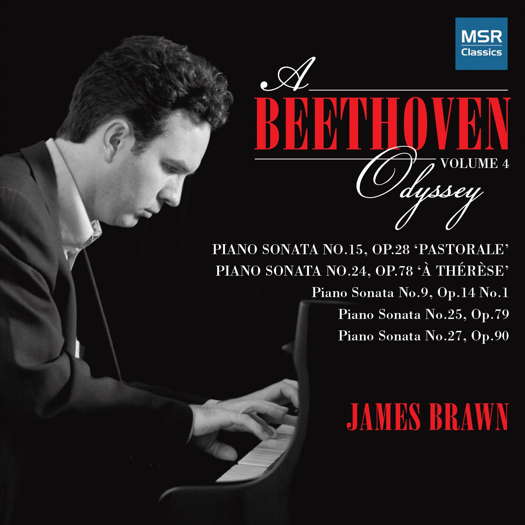- Ignacy Feliks Dobrzyński
- Mary Gertrude Johnstone
- Turin
- Evelyne Berezovsky
- Richard Angas
- Grainger
- Palermo
- Mimis Plessas

A Zany, Madcap Farce
GERALD FENECH listens to Albert Roussel's operetta 'Le Testament de la Tante Caroline'
'... performances are gracefully sophisticated ...'
Albert Roussel (1869-1937) is not renowned as a composer versed in the pleasures of light music. Many music lovers will be unaware of Le Testament de la Tante Caroline (Aunt Caroline's Will), a hilarious operetta whose energy and imagination are enough to elevate the composer, on the basis of this work alone, to the ranks of the great French masters of musical comedy. In his younger days Roussel had served in the navy and travelled widely before deciding to devote his life to music and composition. The result of all these travels left a great influence on his work as well as his imagination. Trained at the school of Franck and D'Indy, he also fell under the spell of Debussy. His unending curiosity can be attributed to his early life. He never stopped evolving, and was never satisfied with the formulaic. He retained the adventurous soul of the sailor, and each work was like a new port of call for him. At the age of sixty-eight, the composer of Evocations and Padmavati suddenly presented the musical world with an operetta, causing such surprise that he had to write an explanatory piece for the press.
Listen — Roussel: Overture (Le Testament de la Tante Caroline)
(8.660479 track 1, 0:01-0:58) ℗ 2022 Naxos Rights (Europe) Ltd :
In Roussel's opinion, it is enormously interesting for a musician to try his hand at a genre new to him, and that is why he ventured into the realm of operetta. The man behind the comedy Roussel set to music was Nino (1896-1965), also known as Michel Verber, who had already enjoyed successful collaborations with Manuel Rosenthal and Jacques Ibert. Nino's inventiveness drew on all kinds of wild ideas, had at times a touch of schoolboy wit and flirted with the risk factor on many an occasion, but was always humorous and typically Parisian. The text he gave Roussel in 1932 was indeed a zany, madcap farce.
Le Testament de la Tante Caroline was completed on 2 October 1933, but it was only on 14 November 1936 that the work was premiered, in translation, in the Czech city of Olomouc, but the reception was reticent. Audiences were not sure what to make of it, and critics felt the composer had struggled to adapt to the lighter genre. The French premiere took place on 11 March 1937, and again, the piece got a mixed reception. Some even wrote to the Culture Ministry to express their indignation about the 'boulevard scenes' and inappropriate spectacle they had witnessed on the Opera-Comique stage. Despite all this stupidity, Roussel's score did garner the admiration of music lovers.
Unfortunately, Le Testament de la Tante Caroline did not remain in the Opera-Comique repertoire, and despite its many virtues, disappeared completely from the musical scene. Thankfully, in 1960, at the request of Roussel's widow, Nino reworked the libretto, cutting it from three acts to one. Marcel Mihalovici adapted the score accordingly, and it is this version that has survived, and is the subject of this historic world premiere recording.
Listen — Roussel: Il est parti? – Je vais ouvrir (Le Testament de la Tante Caroline)
(8.660479 track 5, 0:00-0:55) ℗ 2022 Naxos Rights (Europe) Ltd :
The story is simple really, but it drew from Roussel his most light-hearted music. Aunt Caroline has just died. Having amassed a fortune from selling her body, she has left a legacy of some forty million as well as land and jewellery. Her three nieces, who avoided her while she was alive because of her immoral profession, have nevertheless rushed to her funeral, believing themselves to be her only heirs. Caroline's maid welcomes Noemie, Christine and Beatrice. The former pair are both married, while Beatrice is a deaconess and an old maid. They search Caroline's house for her safe and will, which is then delivered by a lawyer and proves to contain an unpleasant surprise. Their malevolent aunt has imposed a strict condition on her inheritance: her will stipulates that her fortune will go to the first child born to one of the three nieces, giving them one year from the date of her death to produce an heir. After this deadline, it will go instead to the Salvation Army.
So far all three nieces are childless, but try as they might to have their unions blessed by heaven, nothing happens and the twelve months race away into thin air. Independently of each other, Christine and Noemie both feign pregnancy and acquire children from a maternity hospital with the help of a nurse. Unfortunately for them, their ruse is discovered and they have to abandon their claims to the money. In a sudden dramatic twist, however, Aunt Caroline's chauffeur Noel turns out to be the illegitimate child of Beatrice, who gave him up for adoption and became a lay member of a religious order to atone for her sins. Overjoyed to be reunited with her son, Beatrice has the added delight of seeing him named her aunt's sole heir.
Predictable? Maybe, but the music is extremely accessible, graceful and consistently elegant, and the felicitous orchestration evokes one of the composer's most famous pieces, The Spider's Banquet.
Dylan Corlay marshalls his forces with terrific dexterity and panache, and performances are gracefully sophisticated and full of esprit française that continually delights.
Listen — Roussel: Je le proclame légataire universel!
(Le Testament de la Tante Caroline)
(8.660479 track 20, 2:03-3:00) ℗ 2022 Naxos Rights (Europe) Ltd :
A truly exciting discovery, excellently annotated and brilliantly recorded. Not to be missed, especially by aficionados of French opera.
Copyright © 9 June 2022
Gerald Fenech,
Gzira, Malta

CD INFORMATION - ROUSSEL: LE TESTAMENT DE TANTE CAROLINE




